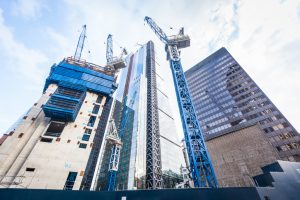3 January 2018
Professional Indemnity insurance after Grenfell – Let us help you negotiate the potential minefield.

It has now been over six months since the tragic fire at Grenfell Tower. The insurance consequences will continue to unfold over the years, but already there are some very clear pointers. Insurers are swiftly reappraising the risks involved in the construction industry with the biggest changes being made to the provision of professional indemnity insurance held by contractors, and more specifically to those contractors which are involved in projects that include the installation and/or design of external cladding.
In the months following the fire, the professional indemnity market has seen a large number of insurers either reduce the levels of cover they are willing to provide to contractors, or have pulled out of the construction sector altogether. Inevitably this has meant an increase in premiums being charged by those insurers still willing to provide the necessary cover in view of the uncertainty surrounding cladding products.
In addition to the uplift in premiums, insurers are now also asking for much more in-depth information of both contractors and developers surrounding the type of cladding works undertaken. Although the primary concern to insurers is cladding panels made from Aluminium Composite Materials (ACM), similar to those used on Grenfell Tower, the questioning is not limited to just these, and in most instances insurers are requesting further information on all cladding systems used. This information will often include the provision of the manufacturer’s product specification of the cladding system, which will include full details on its composition and insulation infill. Most importantly, insurers will need to know if the materials within the cladding system are either non-combustible or fire-resistant.
In addition to the details on the materials used, insurers are also requesting information surrounding the construction process, including but not limited to:
- Are all cladding systems installed in a manner that is compliant with the manufacturer’s recommendations and building regulations?
- What is the height of the property worked on?
- What was the total contract value of the project involving the cladding system?
- Was the cladding aspect of the contract undertaken by a specialist bona-fide subcontractor?
It is also important to note that due to the professional indemnity cover being a ‘claims made’ policy, this questioning will not just apply to current and future contracts. All previous contracts undertaken will also need to be reviewed to ensure the policies in place are providing adequate cover. Any past jobs involving cladding systems may well impact on future renewals and failure to identify and disclose these potential risks could also render future claims invalid.
At Centor we are specialists in this area and we would be pleased to help you negotiate a safe path through the potential minefield.

For more information, get in touch with:
James Airey
020 7330 8717
jaa@centor.co.uk
The fluctuating costs of jewellery and why it matters Directors – why gamble with your personal assets?
